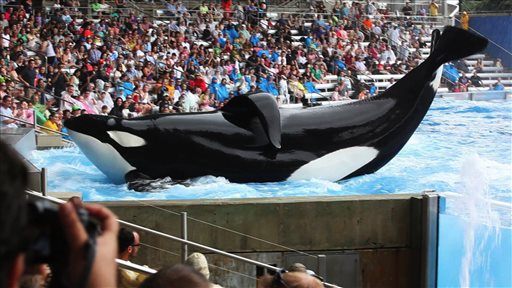‘Blackfish’ showcases the dark side of Sea World
Jul 30, 2013, 7:22 AM | Updated: 10:10 am

If you’ve ever paid to see one of those Sea World shows, you may wish you hadn’t after seeing a new documentary called “Blackfish.”
Eleven million visitors per year see the various Sea World shows in Orlando, San Diego, and San Antonio. Gymnastic-like trainers frolicking with killer whales is often the spectacular highlight of these water-bound entertainments.
But the documentary “Blackfish” challenges the very idea behind Sea World – that killer whales can thrive in captivity.
The film starts with a chilling 911 call from Sea World Orlando in 2010, in which staff report that a whale has eaten one of the trainers.
The victim was Dawn Brancheau, a 40-year-old trainer who was suddenly pulled under water by one of the killer whales and killed. It was a shock since she was Sea World’s star trainer and had worked with this particular whale, Tilikum, for years.
Some said that Dawn would have told you that her fatality was her mistake. But others say they blamed her and call it a bold face lie.
“The industry has a vested interest in spinning (her story,)” said one expert. “It sells a lot of Shamu dolls, it sells a lot of tickets at the gate.”
Another expert says there is no record of an orca whale doing any similar harm in the wild.
“Blackfish” the film sets out to demonstrate that Sea World’s practices, as well as those of other marine parks, are inhumane to the whales and extremely dangerous to their trainers. Not surprisingly, Sea World refused to talk to the filmmakers but eight former Sea World trainers and a couple of former Sea Land managers did.
“We store these whales, in what we call a “module,” which was 20 feet across and 30 feet deep. And the lights were all turned out,” said one former trainer.
Another former trainer says he thinks those conditions may have lead the whales into a psychosis.
“All whales in captivity, they’re all psychologically traumatized. It’s not just Tilikum,” said yet another trainer.
The film traces what it calls a failed 40-year experiment with whales in captivity to our own Puget Sound, circa 1970 – when orca whales were first captured for the burgeoning marine parks industry.
“They had aircrafts, they had spotters, they had speed boats, they had bombs they were throwing in the water. They were lighting the bombs with acetylene torches in their boats and throwing them as fast as they could. They’d herd the whales into coves and then they had fishing boats with seine nets that they would stretch across so none could leave, and then they would just pick out the young ones.”
This caused enough upset that our state soon banned whale hunts for commercial purposes. The whale capture business simply moved to the Atlantic, where Tilikum was captured at the tender age of two (whales have the approximate life-span of humans.)
Tilikum was first sent to Sea Land in British Columbia where he eventually killed a trainer. He was then shipped to Orlando.
Former trainers said that when Tilikum first arrived at Sea World, he was attacked viciously and repeatedly. In the wild, it’s a very matriarchal society. (At Sea World) the animals are squeezed in to very close proximity. Tilikum, was so large, he couldn’t get away, because he just wasn’t as mobile, relative to the smaller and more agile females. There was no place for him to run.
So he spent a lot of time in isolation. Trainers said it was for his own protection; segregating him provides a barrier so the females can’t “kick his butt.”
It was at Sea World Orlando many years later that Tilikum would kill again, this time trainer Dawn Brancheau.
“Blackfish” initially focuses on Tilikum the whale but then broadens out into an indictment of the entire industry. Other captive whales have also been involved in serious attacks, including yet another death of a trainer. All in all, 100 incidents were reported at Sea World alone in the decade before Brancheau’s death, a dozen of them attacks on trainers.
This is a riveting but lopsided documentary, since we only get to hear one side. But as one-sided documentaries go, it’s very compelling.













